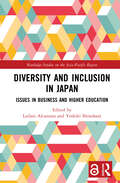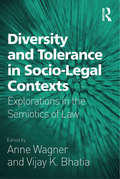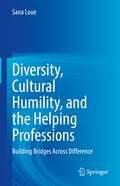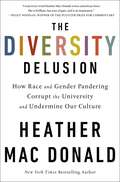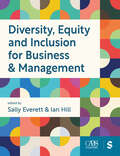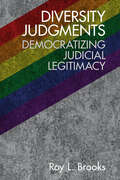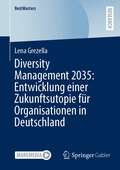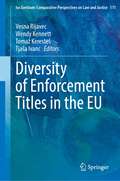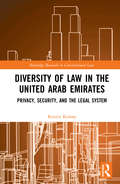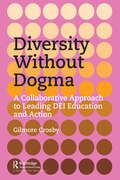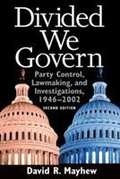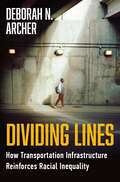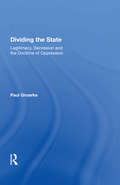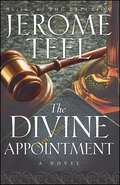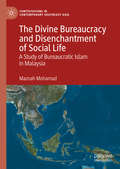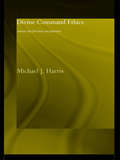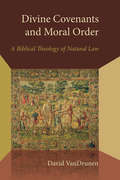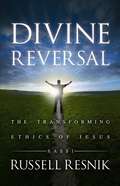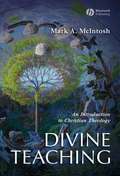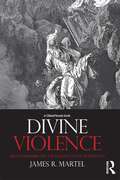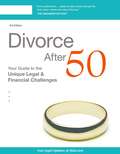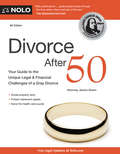- Table View
- List View
Diversity and Inclusion in Japan: Issues in Business and Higher Education (Routledge Studies on the Asia-Pacific Region)
by Lailani Alcantara and Yoshiki ShinoharaAlcantara, Shinohara, and their contributors evaluate the current state of diversity and inclusion (D&I) within business and higher education in Japan, and the importance of D&I to the growth of Japan’s economy and the enrichment of its society. Japan is widely understood to be a homogenous and patriarchal society, and while this is changing and was never wholly accurate, it certainly faces challenges in becoming more diverse and inclusive, particularly in its business and higher educational cultures. Grounded in research and offering best practices, the chapters in this book analyze critical issues relating to D&I in Japan at the individual, organizational, and industry levels. They present both a longitudinal analysis of the evolution and performance outcomes of D&I policies in Japanese corporations across industries, and rich studies of different underrepresented groups in Japan. These groups include immigrants, women, and people with disabilities. The contributors prescribe policies for promoting D&I in higher education, within businesses and at the governmental level. This book is an essential contribution to D&I discourse in the Japanese context that will be of great value to scholars of Japanese society and business, and an important extended case study for those looking at D&I more widely.
Diversity and Tolerance in Socio-Legal Contexts: Explorations in the Semiotics of Law
by Vijay K. BhatiaWhy is there so much resistance to recent issues of tolerance and diversity? Despite efforts of the international community to encourage open-mindedness, recent attempts at international, political and economic integration have shown that religious, cultural and ethnic tolerance and diversity remain under threat. The contributions in the volume reflect the growing importance of these issues and why resistance is so widespread. Part I addresses the relationship between the language of law and its power, whilst Part II explores the interplay of tolerance and diversity under visual, legislative and interpretative perspectives. This collection as a whole offers a combination of varied perspectives on the analysis, application and exploitation of laws and will be a valuable source of information for those interested in the general area of language and the law.
Diversity, Cultural Humility, and the Helping Professions: Building Bridges Across Difference
by Sana LoueToo often, cultural competence training has led to the inadvertent marginalization of some individuals and groups and the reinforcement of existing stereotypes. This text explores the concept of cultural humility, which offers an exciting way forward for those engaged in the helping professions. In contrast to cultural competence, cultural humility challenges individuals to embark on a lifelong course of self-examination and transformational learning that will enable them to engage more authentically with clients, patients, colleagues, and others. The book traces our understanding of and responses to diversity and inclusion over time with a focus on the United States.Topics explored include:Us and Them: The Construction of CategoriesCultural Competence as an Approach to Understanding DifferenceTransformational Learning Through Cultural HumilityFostering Cultural Humility in the Institutional/Organizational ContextCultural Humility and the Helping ProfessionalThe book presents examples that illustrate how the concept of cultural humility can be implemented on an institutional level and in the context of individual-level interactions, such as those between a healthcare provider or therapist and a client.Diversity, Cultural Humility, and the Helping Professions: Building Bridges Across Difference is essential reading for the health professions (nursing, medicine), social work, psychology, art therapy, and other helping professions.
The Diversity Delusion: How Race and Gender Pandering Corrupt the University and Undermine Our Culture
by Heather Mac DonaldBy the New York Times bestselling author: a provocative account of the attack on the humanities, the rise of intolerance, and the erosion of serious learningAmerica is in crisis, from the university to the workplace. Toxic ideas first spread by higher education have undermined humanistic values, fueled intolerance, and widened divisions in our larger culture. Chaucer, Shakespeare and Milton? Oppressive. American history? Tyranny. Professors correcting grammar and spelling, or employers hiring by merit? Racist and sexist. Students emerge into the working world believing that human beings are defined by their skin color, gender, and sexual preference, and that oppression based on these characteristics is the American experience. Speech that challenges these campus orthodoxies is silenced with brute force.The Diversity Delusion argues that the root of this problem is the belief in America’s endemic racism and sexism, a belief that has engendered a metastasizing diversity bureaucracy in society and academia. Diversity commissars denounce meritocratic standards as discriminatory, enforce hiring quotas, and teach students and adults alike to think of themselves as perpetual victims. From #MeToo mania that blurs flirtations with criminal acts, to implicit bias and diversity compliance training that sees racism in every interaction, Heather Mac Donald argues that we are creating a nation of narrowed minds, primed for grievance, and that we are putting our competitive edge at risk. But there is hope in the works of authors, composers, and artists who have long inspired the best in us. Compiling the author’s decades of research and writing on the subject, The Diversity Delusion calls for a return to the classical liberal pursuits of open-minded inquiry and expression, by which everyone can discover a common humanity.
Diversity, Equity and Inclusion for Business & Management
by Sally Everett Ian HillDiversity, Equity and Inclusion for Business & Management is a comprehensive and accessible guide to the evolving landscape of DEI in the discipline. Developed in collaboration with the Chartered Association of Business Schools and written by experts in their fields, this book offers a unique approach, with discipline-focussed chapters that cover Strategy, Leadership, Organisational Behaviour, Marketing, Accounting, Finance and more. As you read about how issues of social justice, diversity, and inclusion relate to your studies and future careers, you will be supported by a range of learning features, including global case studies, critical reflections, and practice questions. This book is essential reading for students of business and management taking modules in DEI and diversity management, as well as those who are interested in responsible business practice. Sally Everett is Professor of Business Education and Vice Dean (Education) at King’s Business School, King’s College London Ian Hill is a Lecturer in Work and Organisations (Education) at King’s Business School, King’s College London
Diversity, Equity and Inclusion for Business & Management
by Sally Everett Ian HillDiversity, Equity and Inclusion for Business & Management is a comprehensive and accessible guide to the evolving landscape of DEI in the discipline. Developed in collaboration with the Chartered Association of Business Schools and written by experts in their fields, this book offers a unique approach, with discipline-focussed chapters that cover Strategy, Leadership, Organisational Behaviour, Marketing, Accounting, Finance and more. As you read about how issues of social justice, diversity, and inclusion relate to your studies and future careers, you will be supported by a range of learning features, including global case studies, critical reflections, and practice questions. This book is essential reading for students of business and management taking modules in DEI and diversity management, as well as those who are interested in responsible business practice. Sally Everett is Professor of Business Education and Vice Dean (Education) at King’s Business School, King’s College London Ian Hill is a Lecturer in Work and Organisations (Education) at King’s Business School, King’s College London
Diversity in Intellectual Property
by Calboli, Irene and Ragavan, Srividhya Irene Calboli Srividhya RagavanThis book aims to create an interface between intellectual property and diversity - including cultural, biological, religious, racial, and gender-based diversity. While acknowledging that the historical rationale for intellectual property protection is based on theories of utilitarian incentives and property rights, the authors of this volume assert that the current intellectual property framework is not incompatible with including diversity as part of its objectives. Through its various themes, this book delves into the debate of whether such inclusion can be made possible and how intellectual property norms could be effectively used to protect and promote diversity. In this volume, leading scholars address ongoing regional, national, and international debates within the contexts of diversity, the existing legal framework, and the broader political and economic climate. The authors tackle such wide-ranging topics as the prohibition against trademarking slurs and concepts of intellectual property in ancient Indian texts.
Diversity Judgments: Democratizing Judicial Legitimacy
by Roy L. BrooksThe US Supreme Court's legitimacy-its diminishing integrity and contribution to the good of society-is being questioned today like no other time in recent memory. Criticisms reflect the perspectives of both 'insiders' (straight white males) and 'outsiders' (mainly people of color, women, and the LGBTQ community). Neither perspective digs deep enough to get at the root of the Court's legitimacy problem, which is one of process. The Court's process of decision-making is antiquated and out of sync with a society that looks and thinks nothing like the America of the eighteenth century, when the process was first implemented. The current process marginalizes many Americans who have a right to feel disenfranchised. Leading scholar of jurisprudence Roy L. Brooks demonstrates how the Court can modernize and democratize its deliberative process, to be more inclusive of the values and life experiences of Americans who are not straight white males.
Diversity Leadership in the U.S. Department of Defense: Analysis of the Key Roles, Responsibilities, and Attributes of Diversity Leaders
by Beth Katz Jefferson P. Marquis Jerry M. Sollinger Kirsten M. Keller Maria C. LytellThis study identifies the knowledge, skills, abilities, and other personal characteristics needed in individuals who will be responsible for implementing strategic diversity plans in the Department of Defense (DoD). The authors interviewed more than 60 diversity leaders in industry, the public sector (including DoD), and academia and reviewed relevant scientific literature, education programs, and advertised job requirements.
Diversity Management 2035: Entwicklung einer Zukunftsutopie für Organisationen in Deutschland (BestMasters)
by Lena GrezellaLena Grezella widmet sich mit ihrem Buch der Utopie eines Diversity Managements in Organisationen des Jahres 2035 in Deutschland. In ihrem Text entwirft sie ein wünschenswertes Zukunftsbild, das mögliche und wahrscheinliche gesellschaftliche Entwicklungen in ihre umfassenden Betrachtungen einbezieht. Die Autorin greift im Rahmen eines qualitativen Forschungsdesigns auf Sachverständigenwissen zurück, um Erkenntnisse über das organisationale Diversity Management der Zukunft zu gewinnen. In den Ergebnissen beschreibt sie Veränderungen für organisationales Handeln und den Umgang mit Vielfalt bis in das Jahr 2035, aus denen sich neue Handlungsfelder für das Diversity Management in Deutschland ergeben. Dabei zeigt die Autorin Vorstellungen über die zukünftige strukturelle Verankerung von Diversity Management sowie die Verantwortlichkeit für diversitybezogene Maßnahmen auf. Damit entwickelt sie ein zukunftsorientiertes Verständnis von Diversity Management und stellt die Merkmale vor, die organisationalen Umgang mit Vielfalt zukünftig ausmachen sollten.
Diversity of Enforcement Titles in the EU (Ius Gentium: Comparative Perspectives on Law and Justice #111)
by Vesna Rijavec Wendy Kennett Tomaž Keresteš Tjaša IvancThis book examines the diversity of enforcement titles in cross-border debt collection, focusing on the types, structure, contents and effects of enforcement titles. It offers a comprehensive overview of judgments, court settlements and authentic instruments from a variety of EU Member States. It primarily employs the comparative legal method to draw conclusions on commonalities and differences, as well as prospects for future approximation of laws. The premise of the research is rooted in the finding that national authorities of EU Member States continue to treat enforcement titles from other Member States with reservations and mistrust despite being committed to the principle of mutual trust. The book identifies the issues of mistrust stemming from the diversity of enforcement titles. The research is based on a rich database of national reports compiled during the course of several large-scale EU Justice Projects. Divided into five parts, the book offers first some general considerations and presents attempts at a systemisation of enforcement titles. The following parts are then devoted to more specialised approaches toward the different types of enforcement titles. However, the connecting line between all parts of the book are the considerations of cross-border enforcement in the EU (and in a limited manner with third States). Herein, research also addresses critical factors regarding the free movement of judgments in the EU, including those of lis pendens and related actions. This book provides a valuable contribution to the Theory of European Civil Procedure. Since it is based on a comparative approach and employs both empirical and doctrinal viewpoints, it should also greatly benefit practitioners involved in cross-border dispute resolution. Overall, the findings should be of interest to a broad audience, including policymakers, judges, practitioners and scholars.
Diversity of Law in the United Arab Emirates: Privacy, Security, and the Legal System (Routledge Research in Constitutional Law)
by Kristin KamøyThis book examines the law and its practice in the United Arab Emirates (UAE). The objective is to understand the logic of the legal system in the UAE through a rounded analysis of its laws in context. It thus presents an understanding of the system on its own terms beyond the accepted Western model. The book shows how the Emirati law differs from the conventional rule of law. The first section of the book deals with the imperial, international, and cultural background of the Emirati legal system and its influences on some of the elements of the legal system today. It maps the state’s international legal obligations according to core human rights treaties showing how universal interpretations of rights may differ from Emirati interpretations of rights. This logic is further illustrated through an overview of the legal system, in federal, local, and free zones and how the UAE’s diversity of legal sources from Islamic and colonial law provides legal adaptability. The second section of the book deals mainly with the contemporary system of the rule of law in the UAE but at times makes a detour to the British administration to show how imperial execution of power during the British administration created forerunners visible today. Finally, the debut of the UAE on the international scene contributed to an interest in human rights investigations, having manifestations in UAE law. The work will be a valuable resource for researchers and academics working in the areas of Comparative Constitutional Law, Legal Anthropology, Legal Pluralism, and Middle Eastern Studies.
Diversity Without Dogma: A Collaborative Approach to Leading DEI Education and Action
by Gilmore CrosbySocial Scientist Kurt Lewin said, "No research without action, and no action without research." Too much of the current DEI (diversity, equity, and inclusion) approach is insight-based instead of action-based. Even though institutional racism is identified as the root problem, the change effort is focused on looking inward for bias instead of taking action to eliminate institutional racism and other isms. A Lewinian approach, in contrast, is balanced. What people think is important, but no more important than what people do. If you bring people together to change things, this will change what people think! We don’t need therapy nearly as much as we need action based on dialogue! Instead of spending your energy soul-searching for evidence in your thoughts and behaviors that you have unconscious biases, this book helps put your energy into doing something practical about racism. To get there, this book uses Lewin’s social science to build a framework for sorting through the many approaches to and positions held on race, racism, diversity, and related topics. While the framework is and must be applicable to any prejudice, systemic or individual, the bulk of this exploration is focused on racism, which to a large degree has become the primary social justice focus of our times. Painfully aware that conversations about race can easily deteriorate into polarization, the author lays a path toward finding common ground.
Divided We Govern: Party Control, Lawmaking, And Investigations, 1946-2002
by David MayhewIn this prize-winning book, a renowned political scientist debunks the commonly held myth that the American national government functions effectively only when one political party controls the presidency and Congress. For this new edition, David R. Mayhew has provided a new Preface, a new appendix, and a new concluding chapter that brings the historical narrative up to date. "Important, accessible, and compelling, David Mayhew’s second edition of Divided We Govern takes the best book on the history of US lawmaking and--against all odds--makes it better.”--Keith Krehbiel, Stanford University "In this welcome updating of his agenda-setting classic, David Mayhew cogently defends his original methodology and finds that divided government remains no less productive of important legislation than unified government, although it is now (thanks mainly to Clinton’s impeachment) strongly associated with prominent investigations of the executive branch. Written with Mayhew’s usual clarity and grace, this is a book to be enjoyed by beginning and veteran students of Congress alike.”--Gary Jacobson From reviews of the first edition: "First-rate. . . . Mayhew’s tabulations and analysis are, quite simply, unimpeachable."--Morris Fiorina, Washington Monthly "Will stand for years as a classic."--L. Sandy Maisel, Political Science Quarterly "Should be read by every student of American politics."--Gillian Peele, Times Higher Education Supplement
Dividing Lines: How Transportation Infrastructure Reinforces Racial Inequality
by Deborah N. ArcherFrom an eminent legal scholar and the president of the ACLU, an essential account of how transportation infrastructure—from highways and roads to sidewalks and buses—became a means of protecting segregation and inequality after the fall of Jim Crow. Our nation’s transportation system is crumbling: highways are collapsing, roads are pockmarked, and commuter trains are unreliable. But as acclaimed scholar and ACLU president Deborah Archer warns in Dividing Lines, before we can think about rebuilding and repairing, we must consider the role race has played in transportation infrastructure, from the early twentieth century and into the present day. As Archer demonstrates, the success of the Civil Rights movement and the fall of Jim Crow in the 1960s did not mean the end of segregation. The status quo would not be so easily dismantled. With state-sanctioned racism no longer legal, officials across the country—not just in the South—turned to transportation infrastructure to keep Americans divided. A wealthy white neighborhood could no longer be "protected" by racial covenants and segregated shops, but a multilane road, with no pedestrian crossings, could be built along its border to make it difficult for people from a lower-income community to visit. Highways could not be routed through Black neighborhoods based on the race of their residents, but those neighborhoods’ lower property values—a legacy of racial exclusion—could justify their destruction. A new suburb could not be for "whites only," but planners could refuse to extend sidewalks from Black communities into white ones. Drawing on a wealth of sources, including interviews with people who now live in the shadow of highways and other major infrastructure projects, Archer presents a sweeping, national account—from Atlanta and Houston to Indianapolis and New York City—of our persistent divisions. With immense authority, she examines the limits of current Civil Rights laws, which can be used against overtly racist officials but are less effective in addressing deeper, more enduring, structural challenges. But Archer remains hopeful, and in the final count describes what a just system would look like and how we can achieve it.
Dividing the State: Legitimacy, Secession and the Doctrine of Oppression (Applied Legal Philosophy Ser.)
by Paul GroarkeThe events of recent history affirm the urgent need for a satisfactory definition of the conditions under which a minority within a state has the legal right to secede. Although the concept of sovereignty has been progressively weakened, it still presents the major theoretical difficulty in this area. There is currently no source of international law that would give a legal body like a court the authority to recognize the division of an oppressive or illegitimate state into separate legal entities. This book accordingly argues for a global system of justice based on a domestic model of compulsory law. It considers some of the technical, procedural and evidentiary issues that would arise in instituting such a regime, and develops the conceptual framework essential for the provision of legal remedies for gross violations of our fundamental human rights.
The Divine Appointment
by Jerome Teel"They aren't hiding just one something, but a bunch of somethings..." Jessica Caldwell hates the day she met him, and she hates him even more. But now the two of them will be connected forever... Eli Faulkner is one of the best trial lawyers in Tennessee. It's what he lives for -- righting injustices. When he's called upon to defend Tag Grissom, an arrogant cardiologist accused of murder, he fi nds himself wondering, could this be more than just a case? Holland Fletcher has always wanted to be a true investigative journalist, but he's never really stepped up to the plate. That is, until he receives an anonymous tip and is plunged into a dangerous realm of intrigue and murder that involves not only the Supreme Court, but the entire nation.
The Divine Bureaucracy and Disenchantment of Social Life: A Study of Bureaucratic Islam in Malaysia (Contestations in Contemporary Southeast Asia)
by Maznah MohamadThis book traces the expansion of Islamisation within a modern and plural state such as Malaysia. It elaborates on how elements of theology, sacred space, resources, and their interactivity with secular instruments such as legislative, electoral, and new social technological platforms are all instrumentally employed to consolidate a divine bureaucracy. The book makes the point that religious social movements and political parties are only few of the important agents of Islamisation in society. The other is the modern and secular state structure itself. Weber’s legal rational bureaucracy or Hegel’s ethical bureaucracy predominantly characterises a modern feature of governmentality. In this instance an Islamic bureaucracy is advantageously situated not only within an ambit of modernity and therefore legality, but divinity and therefore sacrality as well. This positioning gives religious state agents more salience than any other form of bureaucracy leading to their unquestioned authority in the current contexts of societies with Muslim majority rule. One of the requisites of this condition is the homogenisation of Islam followed by ring-fencing of its constituents. The latter can involve contestations with women, other genders, ‘secular’ Muslims, non-Muslims as well as dissenting Muslims with their differing truthful ‘Islams’.
Divine Command Ethics: Jewish and Christian Perspectives (Philosophical Ideas in Debate)
by Michael J. HarrisThe central aim of this book is to attempt to determine the response of the classic texts of Jewish traditions to the famous dilemma posed in Plato's Euthyphro: Does God freely determine morality, or is morality independent of God? The author argues that the picture that emerges from Jewish texts is significantly more complex and nuanced than most of the contemporary Jewish philosophical literature is prepared to concede. While providing an extensive discussion of the perspective of Jewish tradition on divine command ethics, this book develops a position that is distinct from and critical of other views that have recently been advanced in Jewish scholarship. At the same time, the book provides a substantial analysis of some Christian perspectives on divine command ethics. Relevant biblical, rabbinic and later Jewish texts are discussed, as well as some of the relevant views that have been taken in philosophical literature and in Christian and Jewish thought.
Divine Covenants and Moral Order: A Biblical Theology of Natural Law (Emory University Studies in Law and Religion)
by David VanDrunenThis book addresses the old question of natural law in its contemporary context. David VanDrunen draws on both his Reformed theological heritage and the broader Christian natural law tradition to develop a constructive theology of natural law through a thorough study of Scripture.The biblical covenants organize VanDrunen's study. Part 1 addresses the covenant of creation and the covenant with Noah, exploring how these covenants provide a foundation for understanding God's governance of the whole world under the natural law. Part 2 treats the redemptive covenants that God established with Abraham, Israel, and the New Testament church and explores the obligations of God's people to natural law within these covenant relationships.In the concluding chapter of Divine Covenants and Moral Order VanDrunen reflects on the need for a solid theology of natural law and the importance of natural law for the Christian's life in the public square.]>
Divine Reversal: The Transforming Ethics of Jesus
by Rabbi Russell ResnikIn the Old Testament, God often reversed the plans of man. Yeshua's ethics continue this theme. Following his ethics leads to true happiness, forgiveness, reconciliation, fidelity and love.
Divine Teaching: An Introduction to Christian Theology (Blackwell Guides To Theology Ser.)
by Mark A. McIntoshThis innovative work is an introduction to Christian theology with a difference. Not only does it interpret, with clarity and energy, fundamental Christian beliefs but it also shows how and why these beliefs arose, promoting an understanding of theological reflection that encourages readers to think theologically themselves. From Irenaeus and Aquinas to Girard, from Augustine to Zizioulas and contemporary feminist thought, Divine Teaching explores the ways in which major thinkers in the Christian tradition have shaped theology through the wide variety of their encounters with God. It makes theological study adventurous and interactive, not necessarily requiring a faith commitment from all, but allowing readers a thoughtful involvement in the subject that takes seriously the Christian vision of God as the ultimate teacher of theology. Divine Teaching: An Introduction to Christian Theology is an imaginative and lively analysis of the Christian way of thinking, offering vivid and informing insight into the history and practice of Christian theology.
Divine Violence: Walter Benjamin and the Eschatology of Sovereignty
by James R. MartelDivine Violence looks at the question of political theology and its connection to sovereignty. It argues that the practice of sovereignty reflects a Christian eschatology, one that proves very hard to overcome even by left thinkers, such as Arendt and Derrida, who are very critical of it. These authors fall into a trap described by Carl Schmitt whereby one is given a (false) choice between anarchy and sovereignty, both of which are bound within—and return us to—the same eschatological envelope. In Divine Violence, the author argues that Benjamin supplies the correct political theology to help these thinkers. He shows how to avoid trying to get rid of sovereignty (the "anarchist move" that Schmitt tells us forces us to "decide against the decision") and instead to seek to de-center and dislocate sovereignty so that it’s mythological function is disturbed. He does this with the aid of divine violence, a messianic force that comes into the world to undo its own mythology, leaving nothing in its wake. Such a move clears the myths of sovereignty away, turning us to our own responsibility in the process. In that way, the author argues,Benjamin succeeds in producing an anarchism that is not bound by Schmitt’s trap but which is sustained even while we remain dazzled by the myths of sovereignty that structure our world. Divine Violence will be of interest to students of political theory, to those with an interest in political theology, philosophy and deconstruction, and to those who are interested in thinking about some of the dilemmas that the ‘left’ finds itself in today.
Divorce After 50
by Janice GreenLegal information and practical advice for older Americans dealing with divorce Divorce rates are soaring among seniors, but the legal and emotional challenges you face as an older adult are different from those that apply to younger divorcees. That's why you need Divorce After 50, the only guide around that addresses the challenges unique to your age group. Written by an attorney who specializes in divorce among the over-50 age group, Divorce After 50 covers these subjects and much more: -how to get guidance from friends, family, and, as needed, lawyers -ways to divorce -- collaborative, mediated, contested, etc. -marital property: what it is, what you do with it, and how to divide assets and liabilities -how to survive financially during and after divorce -how health care and estate planning are impacted by divorce -alternatives to divorce, including post-nuptial agreements You'll get all the information you need to decide whether and how to divorce, plus plenty of divorce survival stories that help you determine your options -- and show you that there is, indeed, life after divorce, no matter what your age.
Divorce After 50: Your Guide to the Unique Legal and Financial Challenges
by Janice GreenA road map for late-life divorce Divorce can be emotionally devastating at any time, but the emotional and financial challenges are even greater for people who divorce later in life and can face complicated issues of blended families, health care concerns, and retirement planning. Attorney Janice Green brings 30-plus years of experience as a divorce lawyer, and in particular her experience counseling clients over 50, to Divorce After 50. She addresses: Divorce options (including mediation and collaborative divorce) How to receive the best guidance from lawyers and professional advisers Dividing marital property fairly Retirement plan rules Spousal support (alimony) How divorce affects estate planning Keeping good health care (updated to include new rules under the Affordable Care Act) The book also includes divorce survival stories that illustrate your options and provide encouragement. They got through it, and with the help of Divorce After 50, you can, too.
